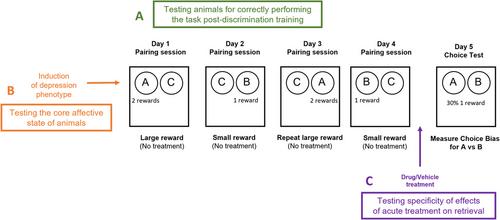下载PDF
{"title":"情感偏差测试和奖赏学习测试:用于抑郁症研究和啮齿动物抗抑郁治疗调查的神经心理学模型。","authors":"Justyna K. Hinchcliffe, Emma S. J. Robinson","doi":"10.1002/cpz1.1057","DOIUrl":null,"url":null,"abstract":"<p>The Affective Bias Test (ABT) quantifies acute changes in affective state based on the affective biases they generate in an associative reward learning task. The Reward Learning Assay (RLA) provides a control assay for the ABT and reward-induced biases generated in this model are sensitive to changes in core affective state. Both tasks involve training animals to associate a specific digging substrate with a food reward. Animals learn to discriminate between two digging substrates placed in ceramic bowls, one rewarded and one unrewarded. In the ABT, the animal learns two independent substrate-reward associations with a fixed reward value following either an affective state or drug manipulation, or under control conditions. Affective biases generated are quantified in a choice test where the animals exhibit a bias (make more choices) for one of the substrates which is specifically related to affective state at the time of learning. The ABT is used to investigate biases generated during learning as well as modulation of biases associated with past experiences. The RLA follows a similar protocol, but the animal remains in the same affective state throughout and a reward-induced bias is generated by pairing one substrate with a higher value reward. The RLA provides a control to determine if drug treatments affect memory retrieval more generally. Studies in depression models and following environmental enrichment suggest that reward-induced biases are sensitive to core changes in affective state. Each task offers different insights into affective processing mechanisms and may help improve the translational validity of animal studies and benefit pre-clinical drug development. © 2024 The Authors. Current Protocols published by Wiley Periodicals LLC.</p><p><b>Basic Protocol 1</b>: Bowl digging and discrimination training</p><p><b>Basic Protocol 2</b>: The reward learning assay</p><p><b>Basic Protocol 3</b>: The affective bias test - new learning</p><p><b>Basic Protocol 4</b>: The affective bias test - modulation of affective biases associated with past experiences</p>","PeriodicalId":93970,"journal":{"name":"Current protocols","volume":"4 6","pages":""},"PeriodicalIF":0.0000,"publicationDate":"2024-06-26","publicationTypes":"Journal Article","fieldsOfStudy":null,"isOpenAccess":false,"openAccessPdf":"https://onlinelibrary.wiley.com/doi/epdf/10.1002/cpz1.1057","citationCount":"0","resultStr":"{\"title\":\"The Affective Bias Test and Reward Learning Assay: Neuropsychological Models for Depression Research and Investigating Antidepressant Treatments in Rodents\",\"authors\":\"Justyna K. Hinchcliffe, Emma S. J. Robinson\",\"doi\":\"10.1002/cpz1.1057\",\"DOIUrl\":null,\"url\":null,\"abstract\":\"<p>The Affective Bias Test (ABT) quantifies acute changes in affective state based on the affective biases they generate in an associative reward learning task. The Reward Learning Assay (RLA) provides a control assay for the ABT and reward-induced biases generated in this model are sensitive to changes in core affective state. Both tasks involve training animals to associate a specific digging substrate with a food reward. Animals learn to discriminate between two digging substrates placed in ceramic bowls, one rewarded and one unrewarded. In the ABT, the animal learns two independent substrate-reward associations with a fixed reward value following either an affective state or drug manipulation, or under control conditions. Affective biases generated are quantified in a choice test where the animals exhibit a bias (make more choices) for one of the substrates which is specifically related to affective state at the time of learning. The ABT is used to investigate biases generated during learning as well as modulation of biases associated with past experiences. The RLA follows a similar protocol, but the animal remains in the same affective state throughout and a reward-induced bias is generated by pairing one substrate with a higher value reward. The RLA provides a control to determine if drug treatments affect memory retrieval more generally. Studies in depression models and following environmental enrichment suggest that reward-induced biases are sensitive to core changes in affective state. Each task offers different insights into affective processing mechanisms and may help improve the translational validity of animal studies and benefit pre-clinical drug development. © 2024 The Authors. Current Protocols published by Wiley Periodicals LLC.</p><p><b>Basic Protocol 1</b>: Bowl digging and discrimination training</p><p><b>Basic Protocol 2</b>: The reward learning assay</p><p><b>Basic Protocol 3</b>: The affective bias test - new learning</p><p><b>Basic Protocol 4</b>: The affective bias test - modulation of affective biases associated with past experiences</p>\",\"PeriodicalId\":93970,\"journal\":{\"name\":\"Current protocols\",\"volume\":\"4 6\",\"pages\":\"\"},\"PeriodicalIF\":0.0000,\"publicationDate\":\"2024-06-26\",\"publicationTypes\":\"Journal Article\",\"fieldsOfStudy\":null,\"isOpenAccess\":false,\"openAccessPdf\":\"https://onlinelibrary.wiley.com/doi/epdf/10.1002/cpz1.1057\",\"citationCount\":\"0\",\"resultStr\":null,\"platform\":\"Semanticscholar\",\"paperid\":null,\"PeriodicalName\":\"Current protocols\",\"FirstCategoryId\":\"1085\",\"ListUrlMain\":\"https://onlinelibrary.wiley.com/doi/10.1002/cpz1.1057\",\"RegionNum\":0,\"RegionCategory\":null,\"ArticlePicture\":[],\"TitleCN\":null,\"AbstractTextCN\":null,\"PMCID\":null,\"EPubDate\":\"\",\"PubModel\":\"\",\"JCR\":\"\",\"JCRName\":\"\",\"Score\":null,\"Total\":0}","platform":"Semanticscholar","paperid":null,"PeriodicalName":"Current protocols","FirstCategoryId":"1085","ListUrlMain":"https://onlinelibrary.wiley.com/doi/10.1002/cpz1.1057","RegionNum":0,"RegionCategory":null,"ArticlePicture":[],"TitleCN":null,"AbstractTextCN":null,"PMCID":null,"EPubDate":"","PubModel":"","JCR":"","JCRName":"","Score":null,"Total":0}
引用次数: 0
引用
批量引用
The Affective Bias Test and Reward Learning Assay: Neuropsychological Models for Depression Research and Investigating Antidepressant Treatments in Rodents
The Affective Bias Test (ABT) quantifies acute changes in affective state based on the affective biases they generate in an associative reward learning task. The Reward Learning Assay (RLA) provides a control assay for the ABT and reward-induced biases generated in this model are sensitive to changes in core affective state. Both tasks involve training animals to associate a specific digging substrate with a food reward. Animals learn to discriminate between two digging substrates placed in ceramic bowls, one rewarded and one unrewarded. In the ABT, the animal learns two independent substrate-reward associations with a fixed reward value following either an affective state or drug manipulation, or under control conditions. Affective biases generated are quantified in a choice test where the animals exhibit a bias (make more choices) for one of the substrates which is specifically related to affective state at the time of learning. The ABT is used to investigate biases generated during learning as well as modulation of biases associated with past experiences. The RLA follows a similar protocol, but the animal remains in the same affective state throughout and a reward-induced bias is generated by pairing one substrate with a higher value reward. The RLA provides a control to determine if drug treatments affect memory retrieval more generally. Studies in depression models and following environmental enrichment suggest that reward-induced biases are sensitive to core changes in affective state. Each task offers different insights into affective processing mechanisms and may help improve the translational validity of animal studies and benefit pre-clinical drug development. © 2024 The Authors. Current Protocols published by Wiley Periodicals LLC.
Basic Protocol 1 : Bowl digging and discrimination training
Basic Protocol 2 : The reward learning assay
Basic Protocol 3 : The affective bias test - new learning
Basic Protocol 4 : The affective bias test - modulation of affective biases associated with past experiences


